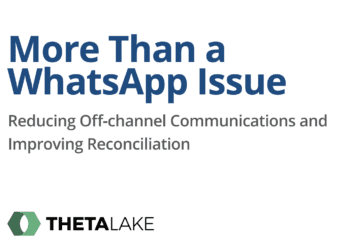With M&A activity on the rise, a commitment to a strong data management program can help businesses to avoid expensive — and often dangerous — compliance and risk aggregation missteps. Kelvin Dickenson of Opus explains.
In 2018, there were 375 M&A deals valued at over $1 billion in the United States alone. Even in years with the least M&A activity, M&A transactions happen with enough frequency to effect substantial changes that impact numerous credit unions, banks, exchanges, broker-dealers and investment or commodities firms, not to mention many nonfinancial institutions.
Target companies end up with new parent companies, creating new hierarchical structures that can affect thousands of entities. Addresses and other pertinent details change, and headquarters may often be domiciled in altogether different states post-merger.
These and many other vitally important details can quickly shift, leaving once-trusted golden copies of data full of inaccuracies that proliferate incorrect information throughout an institution’s records, resulting in a domino effect of out-of-date data that travels from one information silo to the others.
These inaccuracies, in turn, impact the numerous clients, counterparties and subsidiaries of these financial institutions in their home countries and abroad. This underlines the urgent need for the multiple additional data silos created by any M&A transactions to be reconciled with the info of related and impacted entities – and at the fastest speeds possible.
The Example of the Bank of America Acquisition of Merrill Lynch
A prime example of the confusion that can ensue after an acquisition is seen in the 2009 acquisition of Merrill Lynch by financial giant Bank of America.
After this acquisition, the effected entities were likely referred to in customer relationship management (CRM) software as either “Merrill companies” or “BofA companies,” but in reality, the complex family trees of these two financial giants contained many entities with differing legal names that are not obviously BofA or Merrill Lynch – hardly an accurate and dependable way to manage the view into such a large, diverse and systemically important institution.
Many M&A events take place each year that affect institutions just like these. Any such corporate events will substantially impact the veracity of data in reference repositories for parent institutions and subsidiaries, effecting the risk ratings and roll-ups of these and all affiliated entities.
In order to avoid exposing themselves to unnecessary risk, institutions must proactively streamline compliance processes, and a clean, trustworthy, single, golden source of data is essential in order for this streamlining to happen.
A Good Data Maintenance Program is the Key to Compliance
In order to maintain a reliable single source of truth, it is imperative that organizations implement sound data maintenance programs so that they can proactively address situations in which data might become outdated.
One common scenario in which data could be compromised involves businesses that use transactional accounting systems that continually create duplicates. This means that for each and every transaction that takes place in the system, a duplicate record is created for a single vendor entity, which can create up to thousands of duplicate records each month — a situation that is greatly compounded and complicated by any kind of M&A transaction.
While transactional accounting systems are not at all unusual, it is imperative for institutions operating under such a system to have a plan in place to resolve these duplications.
Records must be matched, deduplicated and cleansed to create unique legal entity records. Equally important, these records must be maintained through fastidious monthly upkeep that continues to identify duplicates and update the master file.
Another data issue that is complicated by M&A transactions is that of multiple information silos throughout organizations. M&A activity compounds this problem by creating more information silos within organizations. Different silos across companies will house duplicate and conflicting or outdated information.
Outdated information exposes organizations to risk when incorrect information about a client or subsidiary does not clearly reflect connections to high-risk people, institutions or locations.
It is essential in scenarios like this that organizations institute a program in which data is consolidated, cleansed and deduplicated and, after that, enriched with data from each of the multiple silos.
After the data has been cleansed and deduplicated, each record should be matched to its correct legal entity identifier (LEI) and with other additional proprietary attributes as needed to drive downstream business decisions (for example DUNS numbers, Orbis IDs, SIC codes) in order to eliminate the possibility of error so that businesses have all the information they need to effectively carry out the routine vetting procedures that protect them from risk.
Companies can then be equipped with a clean, up-to-date, cross-referenced master file that provides a holistic view across all data silos, along with continuous monitoring to ensure the data remains clean and up-to-date.
M&A Activity Shows No Signs of Slowing Down
With M&A activity expected to increase in 2019 by about 70 percent over last year, institutions must make the maintenance of a clean and trustworthy golden copy of data a matter of cardinal importance if they are to successfully avoid exposing their businesses to risk.
Procedures that are preemptively put in place to facilitate compliance can shield businesses from the enormous fines that are routinely leveled when institutions fail to take appropriate measures to protect themselves.
A commitment to a strong data management program can help businesses avoid expensive — and often dangerous — compliance and risk aggregation missteps.



 Kelvin Dickenson in the President of
Kelvin Dickenson in the President of 






